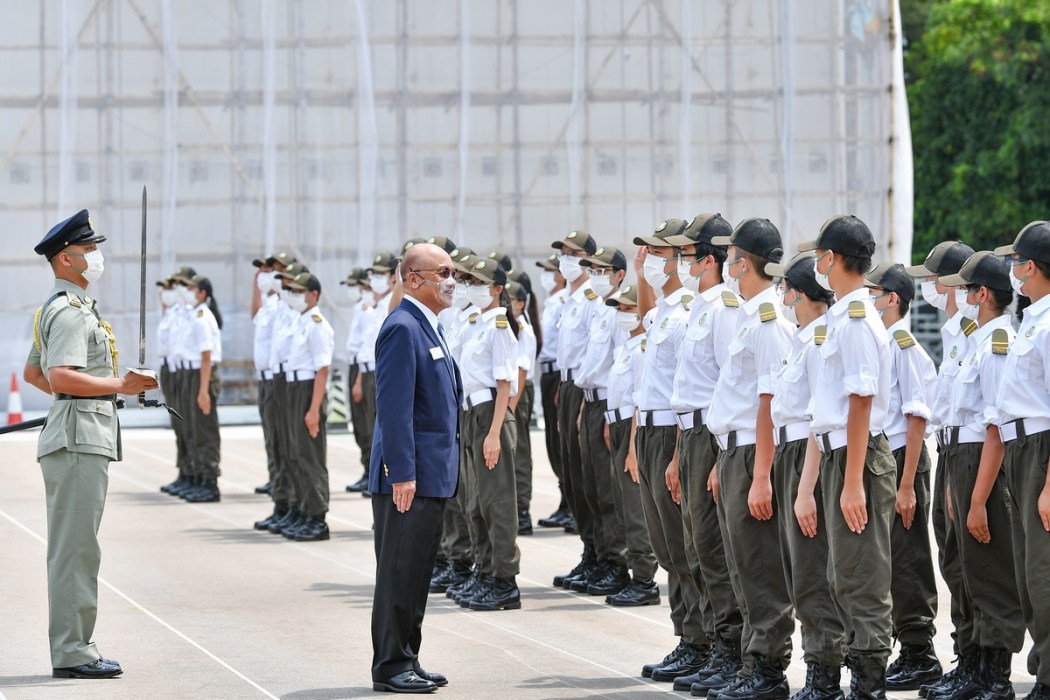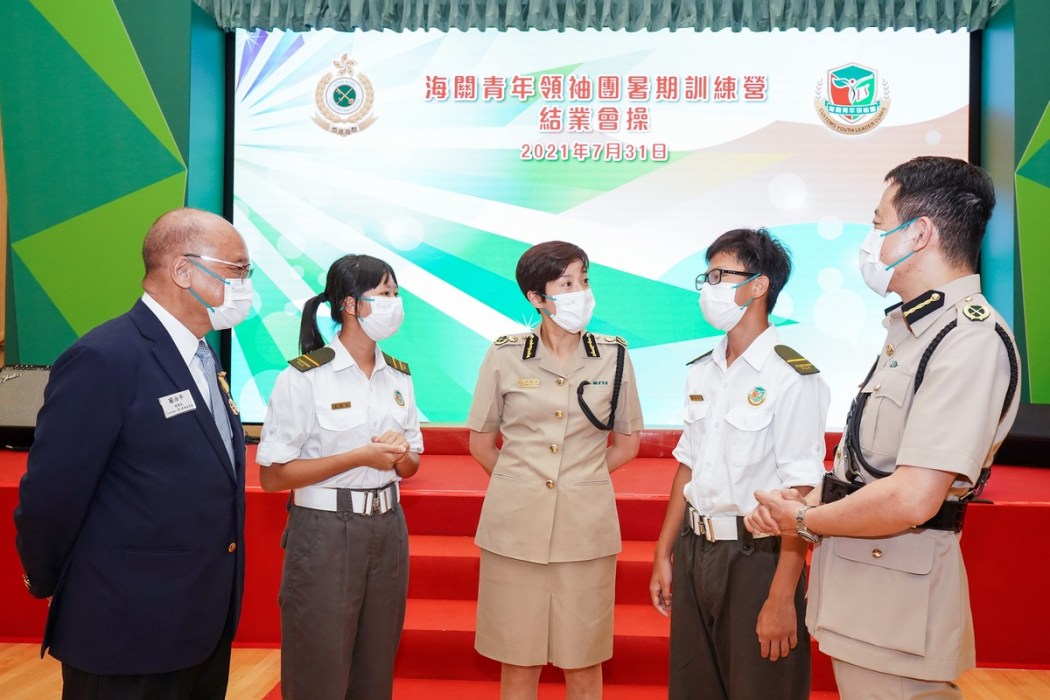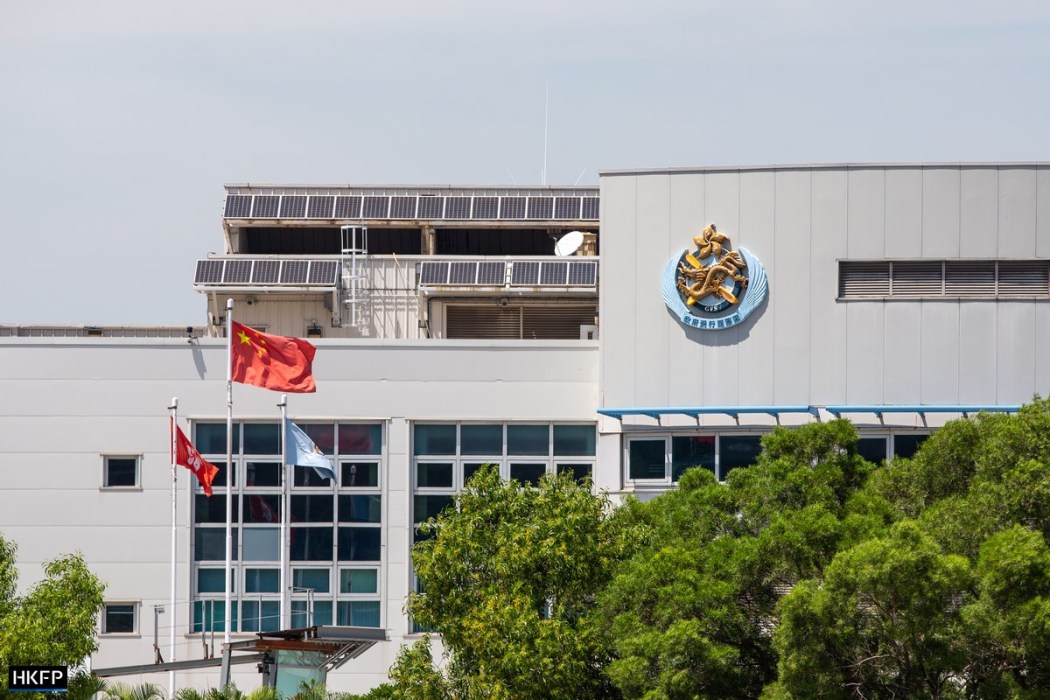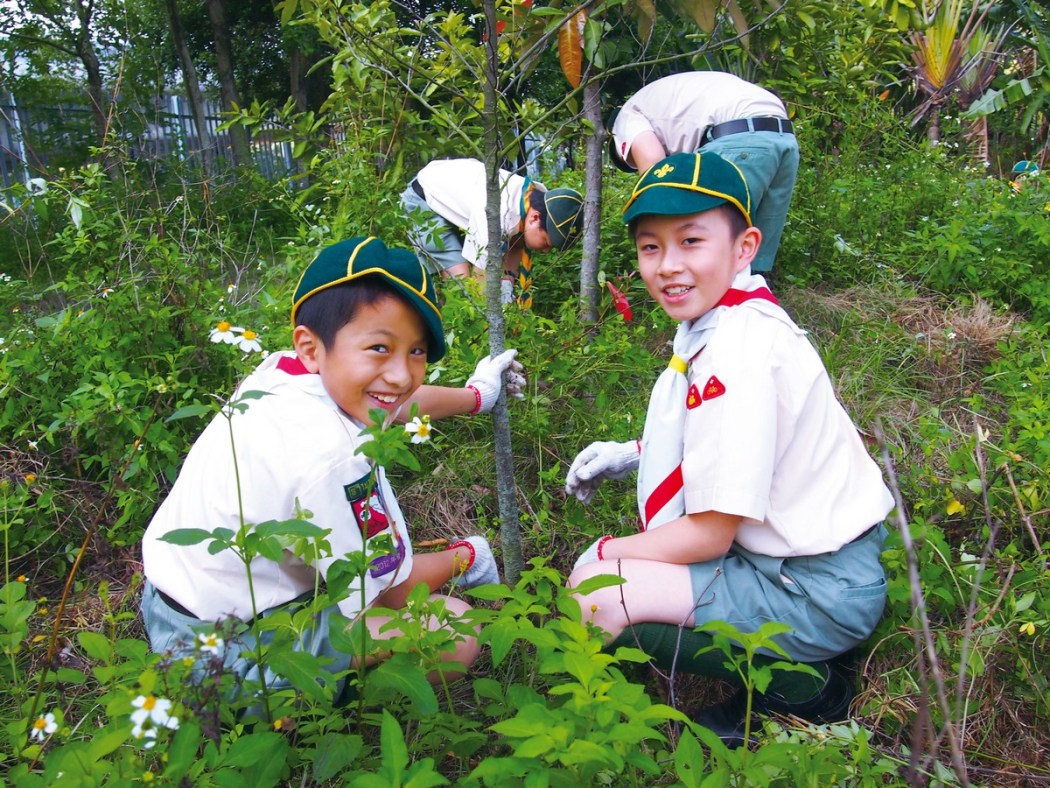The search for national security frequent flier miles is leading some of our leaders to strange places.
While nobody was looking, the Security Bureau has hatched the interesting idea that all the government’s uniform-wearing departments should sprout uniformed youth groups. This is an attempt at a “do-it-yourself” patch for the education system, which in the view of security fanatics is failing to inculcate acceptable quantities of discipline and patriotic enthusiasm.

I stumbled across this by accident. In a government press release on a Customs and Excise event it said that “Customs Youth Leaders” had run a game stall. Who they?
Over to the department’s website, where all is revealed: “The Customs Youth Leader Corps is a new youth uniformed group established by Customs under the ‘Customs YES’ programme. It aims to help members boost their self-confidence and develop team-oriented leadership skills through disciplinary training, regular drills and different education-oriented activities, thus paving the way for them to become distinguished youth leaders in the community.”
The Customs YES programme has been running for 10 years or so – easily predating current political strains — and involved the usual sort of visits, excursions and such for school or youth groups. No doubt the original intention was to boost recruiting. The uniformed bit is the new thing.
The atmosphere pervading the new activity can be gauged from this report in the pro-government media of a visit to a local PLA base:

“Customs hopes that, through this visit, members of the CYLC would have a more comprehensive understanding of the motherland and the people’s army, as well as a deeper understanding of the splendid civilisation and magnificent achievements of the Chinese nation. Moreover, by viewing the models of the PLA’s military equipment, the members could witness closely the PLA’s advanced development in military equipment and its glorious history in maintaining Hong Kong’s long-term prosperity and stability. All of the members also expressed their excitement and deep encouragement after the visit, which has enabled them to correctly understand national affairs and strengthen their recognition of national identity.”
It’s magnificent, but it’s not journalism, to paraphrase General Bosquet.
Well, naturally I wondered who else is getting up to this sort of thing; surely not the Correctional Services Department? Oh yes. “Rehabilitation Pioneer Leaders is a youth uniformed group established in July 2018. Youngsters with leadership potential are recruited, brought together and offered diversified training with a view to broadening their horizon, developing their potential and discipline as well as strengthening a sense of social responsibility. They are also encouraged to actively contribute to the society in future by helping promote law-abiding and inclusive values for a better Hong Kong.”
The possibilities in this one look really interesting. The department offers visits to “institutions” (prisons) and chats with PICs (persons in custody or, as we used to say, prisoners). Also the inevitable summer camp only lasts three days, which suggests that the usual orgy of foot drill may be omitted.

With a sinking heart I turned to the Immigration Department, which offers this: “… the Department has launched a new youth training programme, namely ‘Immigration Department Youth Leaders’. It aims at providing disciplinary and leadership training to students of Secondary 3 to Secondary 6 so as to help them foster positive values and the spirit of serving the society, as well as to widen their horizons.”
And eventually, to where all this should perhaps have started, the meeting of the Legislative Council Security Panel last September, which actually had a menu item on the subject of uniformed department youth groups, and a government paper on the subject. In which, further horror, we find the Fire Services Department: “FSD aims at recruiting about 200 students for the uniformed group in the 2021/22 school year. FSD plans to arrange regular foot drill and various training programmes for the uniformed group.”
The Security Bureau also notes that the Civil Aid Services and Auxiliary Medical Service both have cadet branches. These have been around for a long time and are not really quite the same sort of thing.
Why, you may wonder, is the Government Flying Service not roped in for the cause? It seems they get off the hook because it’s a very small department and they already do a lot of cooperative stuff with the Air Cadet Corps.
Apart from the GFS it is evidently the bureau’s view that every department in its territory should have a uniformed youth wing. The Security Panel, as far as one can tell from the minutes, swallowed all this happily and asked for more.

In a sense all this is nothing new. The Police have had a youth wing for a long time, the Junior Police Call, for which they rather implausibly claim an active membership of 170,000. For a long time this has performed the useful function of providing young people with a friendly encounter with the force before they reach the prime age for being stopped and searched in MTR stations.
Even by other standards the new bodies are quite small. Those launched in the other departments only run to about 800 members altogether. The Boy Scouts, who are generally considered the largest of the civilian (or at least non-government – they are all pretty militaristic) uniformed groups, have 95,000 members. The CAS and AMS have over 6,000 between them.
No doubt the departmental groups, which seem to have no financial constraints and can offer interesting experiences beyond the reach of civilians, will grow and prosper. Nor is this the upper limit of the Bureau’s plans: “Security Bureau is considering establishing an elite youth leadership corps by selecting outstanding members from various uniformed groups. More diversified and valued events, such as training camps specially designed for elite youth leaders, becoming work shadows of government officials or summer internship opportunities, will be provided to them, with a view to grooming them to become the pillars of our future society.”

The question which all this raises, or at least the big question, is whether we want the national security people to have a side gig running youth organisations, and whether in particular the Security Bureau is the right place to be selecting and grooming the “pillars of our future society.”
Ibsen wrote that “The spirit of truth and the spirit of freedom … are the pillars of society.” These do not seem to be a major preoccupation of the Security Bureau.
And after all bureaucratic government is based on the notion of division of labour. Education is a matter for the education people and security is a matter for the security bods. The care and feeding of uniformed groups, as it happens, has hitherto been left to the Home Affairs Bureau, which subsidises 11 of them. Other services to youth come under the Social Welfare Department.
If another bureau is going to trample in this area we may see disputes over fairness and equity. Will the Young Customers, or the Young Immigrants, be seen to be spoiled compared with the Boys Brigade and the Girl Guides? Will established organisations be happy to see an influx of lavishly-supported competitors, possibly followed by the departure of their “outstanding members” to the new super-group?

The needs of youngsters are already inconveniently split between Home Affairs, Social Welfare and Education. Bringing in a fourth party is perhaps going to lead to confusion and incoherence. We may also wonder about the effect on the departments concerned. The CAS and AMS have cadets because they have useful work for cadets to do. Merely showing the future pillars of society the departmental ropes may become a nuisance.
I also have other worries. Let me insert here that I used to be a youth leader and, later on, a trainer of other youth leaders. Training is necessary. There is a difference between leading a youth group and training new departmental recruits. Fundamentally a youth leader has to convince his charges that he is there to serve their needs, not for them to meet his or someone else’s.
Then there are other possible problems. No doubt everyone involved appears to be propelled by the highest motives, but that is what we used to think about the Catholic Church.
Many years ago a HKU scholar actually did a research project on uniformed groups in Hong Kong and concluded that “participation in uniformed groups was associated with higher levels of social skills, helping attitudes, and leadership”. But that does not help us very much in deciding what to do with our young members. Do people with helping attitudes etc gravitate to uniformed groups or do group members become more helpful?

The only curriculum item which seems to be of universal interest to the new groups is foot drill. A tactful choice, as the Secretary for Security, John Lee, recently expressed the view that “Marching is an important part of discipline and team spirit training.” But is it?
Some people enjoy foot drill and some people enjoy watching it. I am in both categories. But during many hours of watching this activity between bursts of providing the music for it, I did not see any particular educational merit in it. It has the obvious practical attraction that one adult can keep 50 kids busy simultaneously, and the uniformed departments have plenty of people qualified to teach it. This is not the usual way of choosing your teaching programme.
Anyway, I have retired from the parade music business. To Europeans of my generation the idea of teaching kids to goose-step is obscene.
If I may make a parting suggestion though, the kids – and the musicians – would find life easier if local parade organisers dropped the ambition to march at a Napoleonic 120 paces a minute. The French Foreign Legion achieves high levels of discipline and team spirit marching at 88.
Support HKFP | Policies & Ethics | Error/typo? | Contact Us | Newsletter | Transparency & Annual Report | Apps
Help safeguard press freedom & keep HKFP free for all readers by supporting our team
| HKFP is an impartial platform & does not necessarily share the views of opinion writers or advertisers. HKFP presents a diversity of views & regularly invites figures across the political spectrum to write for us. Press freedom is guaranteed under the Basic Law, security law, Bill of Rights and Chinese constitution. Opinion pieces aim to point out errors or defects in the government, law or policies, or aim to suggest ideas or alterations via legal means without an intention of hatred, discontent or hostility against the authorities or other communities. |

More HKFP OPINION:
HKFP has an impartial stance, transparent funding, and balanced coverage guided by an Ethics Code and Corrections Policy.
Support press freedom & help us surpass 1,000 monthly Patrons: 100% independent, governed by an ethics code & not-for-profit.










